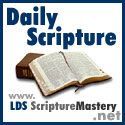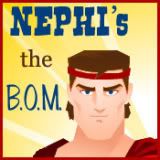When the history of this world is finally written up with an eternal perspective, many events will vie as being worthy to be included. However, because of their significance to every person who has ever lived on this earth or who will ever live on it, the events of the last week of the Savior’s life—from the Sunday morning of his triumphal entry into the city of Jerusalem to the Sunday morning of the resurrection—will undoubtedly be acclaimed as the greatest week in history. Without the events of that week, particularly those which took place in the Garden of Gethsemane and at the time of the resurrection, everything else is virtually meaningless.
Obviously an article such as this could barely list, let alone discuss, all the week’s events that are recorded in the scriptures. Thus, the article will discuss in some detail only one or two events from each day, and it will mention only briefly some of the others.
Tuesday and Wednesday

The record is clear, however, that after the events of Sunday and Monday, when the common people had demonstrated their love and interest in the Messiah, both the secular and religious leaders felt threatened by his possible leadership and they determined they would challenge him and hopefully would discredit him in the eyes of the people. Thus, they had spent their time devising barbed questions with which they hoped to discredit him.
When the Savior arrived at the temple mount, the first group to come forth with their question was a delegation representing the hierarchy of the temple. They remembered only too vividly how he had cast out the moneychangers and had accused them of making “his” house a den of thieves. Therefore, they accosted him with their carefully prepared question: “By what authority doest thou these things? and who gave thee this authority?” (Matt. 21:23.)
The Savior countered with a question of his own: “I also will ask you one thing, which if ye tell me, I in like wise will tell you by what authority I do these things. The baptism of John, whence was it? from heaven, or of men?” (Matt. 21:24–25.)
It is of interest to note that the members of the delegation did not consider answering him with what they really believed; rather, they considered their answer in light of how the people might respond, for “they reasoned with themselves, saying, If we shall say, From heaven; he will say unto us, Why did ye not then believe him?
“But if we shall say, Of men; we fear the people; for all hold John as a prophet.
“And they answered Jesus, and said, We cannot tell. And he said unto them, Neither tell I you by what authority I do these things.” (Matt. 21:25–27.)
The Savior then turned questioner, and with the challenging introduction of “What think ye,” he gave his last three parables to a public audience: the parable of the Two Sons, the parable of the Wicked Husbandmen, and the parable of the Royal Marriage Feast. (See Matt. 21:28–46; Matt. 22:1–14.)
The next group to attempt to ridicule the Master were the Herodians, those who supported the rulership of Herod and the Roman leaders and who sought to bring down any possible new religious leadership. Their barbed question was: “What thinkest thou? Is it lawful to give tribute unto Caesar, or not?
“But Jesus perceived their wickedness, and said, Why tempt ye me, ye hypocrites?
“Shew me the tribute money. And they brought unto him a penny.
“And he saith unto them, Whose is this image and superscription?
“They say unto him, Caesar’s. Then saith he unto them, Render therefore unto Caesar the things which are Caesar’s; and unto God the things that are God’s.” (Matt. 22:17–21.)
The Sadducees were the next group to attempt to trick the Savior; they were of that faction of Judaism who were the avowed opponents of the Pharisees and who disagreed with them on many religious questions, including the resurrection. On this occasion the Sadducees asked the Master a question based on the extremely unlikely situation of a woman who had been married to, and then widowed by, seven consecutive brothers. Their query was, “in the resurrection whose wife shall she be of the seven?” (Matt. 22:28.)
The Savior, sensing that the real question was not whose wife she would be, but whether or not there was indeed a resurrection, answered their direct question but briefly, pointing out that eternal marriage relationships were determined by the power of the priesthood here upon this earth; thus, “they neither marry, nor are given in marriage” in the resurrection.
Then the Master dealt with the real substance of the question: “But as touching the resurrection of the dead, have ye not read that which was spoken unto you by God, saying, I am the God of Abraham, and the God of Isaac, and the God of Jacob? God is not the God of the dead, but of the living.” (Matt. 22:30–32.)
The honest in heart who were present quickly recognized the unassailable logic used by the Savior: Inasmuch as Abraham, Isaac, and Jacob had all died many years before, yet God still said he was their God and that he was God only of the living, then Abraham, Isaac, and Jacob must still be living! Certain of the scribes who were present exclaimed, “Master, thou hast well said.” The logic silenced the Sadducees, “and after that they durst not ask him any question at all.” (Luke 20:39–40.)
The final group, the Pharisees, were ready with their question, however, which was put to the Master by one of their number, a lawyer: “Master, which is the great commandment in the law?” (Matt. 22:36), or, as Mark phrased it, “Which is the first commandment of all?” (Mark 12:28).
The Savior’s answer, however, was definite and unequivocal. He replied in almost the same words used by Moses with the children of Israel, which words Moses had commanded the Israelites to teach diligently to their children: “Thou shalt love the Lord thy God with all thy heart, and with all thy soul, and with all thy mind. This is the first and great commandment. And the second is like unto it, Thou shalt love thy neighbour as thyself.” (Matt. 22:37–39.)
Daniel H. Ludlow, “The Greatest Week in History,” Ensign, Apr 1972, 34









No comments:
Post a Comment